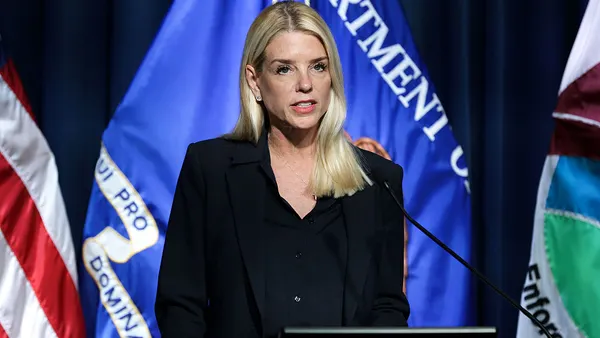HR practitioners often arrive to the field via winding roads that take them from job to job, subject to subject and organization to organization. Opportunities appear at the right place and at the right time, leading to an unexpected, people-centric career.
For Ashley Braband, that road began at ESPN. Braband spent more than a decade producing all manner of content for TV, podcasts and online formats. Then, in 2021, she received a call from fellow ESPN veteran and former mentor Jamie Horowitz, who asked Braband to join a new company he planned to launch with former NFL quarterback Peyton Manning.

“It was pretty much a company in name only,” Braband told HR Dive in an interview, and the offer represented a stark contrast compared to her then-current role at ESPN, an established name in the sports media world. But she was excited at the prospect of working for Horowitz again; “I’d walk through fire for that man, so I said, ‘Let’s go,’” Braband said.
‘Building the plane as we were flying it’
Some four years later, the company now known as Omaha Productions has taken off in a big way thanks in part to its flagship program, “Manningcast,” an alternative live broadcast of ESPN’s “Monday Night Football.” Braband, Omaha’s first employee, has played a central part in that growth.
“It was me kind of figuring out everything,” Braband said of her first days at Omaha, during which she made decisions on subjects ranging from purchasing insurance policies to building the company’s website to creating its mission statement.
To top it off, Braband was also the company’s lead recruiter, which she described as a challenge in part because it meant convincing other sports media professionals to leave their jobs at more established firms for Omaha.
“It was intellectually stimulating and challenging, but it was so fun,” Braband said. “We were kind of building the plane as we were flying it.”
Eventually, the questions Braband was asked to answer drifted into what might seem familiar to the average HR person: Would Omaha give time off for holidays? Which benefits plans would it offer? How many employees would each department require?
Horowitz began to take notice of the organizational gap that Braband was filling, she said, and that led him to formally ask Braband to become Omaha’s head of people and culture.
“There was this hole where I was everybody’s answer to questions that came up all the time,” she said. “Because I had all this experience at the beginning being in touch with every department, I had those answers or could figure them out.”
‘Remember that you are an employee’
Braband’s early career at Omaha may seem familiar to those who have operated as an HR department of one. Over time, she said she has been able to work with third-party management consultants and now works with Omaha’s head of HR to build out the department.
The company has also formalized several of its policies since its early days. Braband gave the example of Omaha’s parental leave policy, which grants all new parents 15 weeks of paid leave. It’s a personal topic for Braband, who said she drew from her own experience as a parent in media production — a field in which it can be difficult for employees to take leave — when advocating for Omaha’s policy.
“We try as much as possible to take that weight off of your shoulders because it is such a life-changing moment,” Braband said.
Similarly, Omaha maintains an open paid time off policy, which Braband said can be a challenging proposition for a production company with tight schedules. To make it easier for employees to find time, Omaha schedules “light weeks,” in which all nonessential internal meetings are canceled, so that employees know that there are slower periods when taking PTO is more feasible. And new for 2025, Omaha also has begun a minimum vacation requirement of two weeks per year to further encourage employees to step away, Braband added.
Braband said she credits Manning and Horowitz with creating a culture that allows for the creation of such policies and, by extension, supports people. She also advised HR professionals, especially those new to the field, to maintain an employee-centric perspective as a guide for their work.
“Remember that you are an employee,” Braband said. “You know how employees want to be treated [...] I encourage people out there to keep that in mind.”













